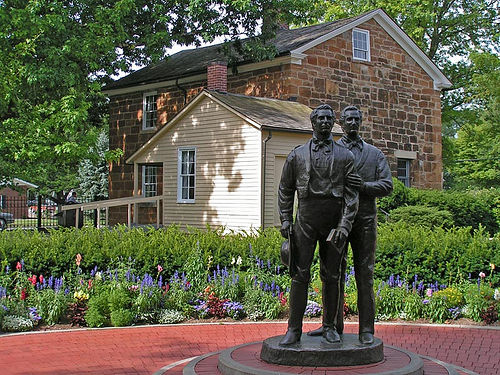Carthage Jail
In 1844, William Law, a disaffected member of The Church of Jesus Christ of Latter-day Saints, published a paper full of slander aimed at the Prophet Joseph Smith, even calling for Smith to be arrested and hung. The Nauvoo city council authorized the destruction of the printing press. Non-Latter-day Saint neighbors were incensed and a riot followed. Joseph Smith, Hyrum Smith and others were arrested for inciting the riot. The governor promised the men that if they submitted to the arrest and went to jail in Carthage, he would protect them. The men agreed to go to jail and undergo a trial. While in Carthage, Joseph was threatened numerous times.
On the morning of June 27, 1844, while at Carthage Jail, Joseph wrote a letter to his wife, Emma, "I am very much resigned to my lot, knowing I am justified, and hove done the best that could be done. Give my love to the children and all my friends ... May God bless you all" (History of the Church 6:605).
During the afternoon the four men in the jail (Joseph, Hyrum, John Taylor and Willard Richards) were in considerably low spirits. John Taylor was asked to sing a hymn called “A Poor Wayfaring Man of Grief.” One part of the hymn was especially fitting to their current situation:- In pris’n I saw him next—condemned
- To meet a traitor’s doom at morn;
- The tide of lying tongues I stemmed,
- And honored him ‘mid shame and scorn.
- My friendship’s utmost zeal to try,
- He asked, if I for him would die;
- The flesh was weak, my blood ran chill,
- But my free spirit cried, ‘I will!’
- Then in a moment to my view
- The stranger started from disguise.
- The tokens in his hands I knew;
- The Savior stood before my eyes.
- He spake, and my poor name he named,
- ‘Of me thou hast not been ashamed.
- These deeds shall thy memorial be;
- Fear not, thou didst them unto me.
- ("A Poor Wayfaring Man of Grief," LDS Hymns, no. 29)
Shortly after 5:00 in the afternoon, a mob of 100 men with blackened faces for disguise, headed for Carthage, stormed the jail, and began firing through the door. Hyrum was shot in the face. Joseph leaned over his brother and exclaimed, “Oh dear, brother Hyrum!” Joseph fired three shots through the door at the mob. John Taylor attempted to leave through the window, but was hit a number of times. One shot hit his pocket watch, another his wrist, another his left knee, and a final shot hit his left hip. Joseph Smith went to the window, knowing that there was no safety in staying in the room. He was shot from outside, and killed, his body falling through the window. Willard Richards, who had been told by the Prophet that he would be safe, luckily only had his ear slightly grazed.
The mob ran outside to make sure Joseph was dead. Fearing the mob would return, Willard Richards hid John Taylor, who was still alive. The mob did not return. Joseph Smith’s brother Samuel had heard about the threats on Joseph’s life and was on his way to Carthage. He arrived that same evening and was the one who wrote the letter back to Nauvoo telling the Saints that their prophet and his brother Hyrum were dead.
Carthage Jail was used as a jail for 25 years before being converted into a home. The Church bought the building and property in 1903 for $4,000. Joseph F. Smith (son of Hyrum Smith) was president at the time it was purchased. The Church did not start to restore it until 1938. It is now open for tours.
External Links
- Joseph Smith Prophet of God
- Wikipedia - Joseph Smith, Jr. - Wikipedia, the free encyclopedia
- Joseph Smith - American Prophet
- Joseph Smith Daguerreotype
- JS-H 1
- Fufilled Prophecies of Joseph Smith
- Joseph Smith
- Joseph Smith: Biography and Much More From Answers.com
- Joseph Smith Jr. - Wikiquote
- The Testimony of the Prophet Joseph Smith
- Joseph Smith: Prophet, Revelator, Human; Interview with Richard Lyman
